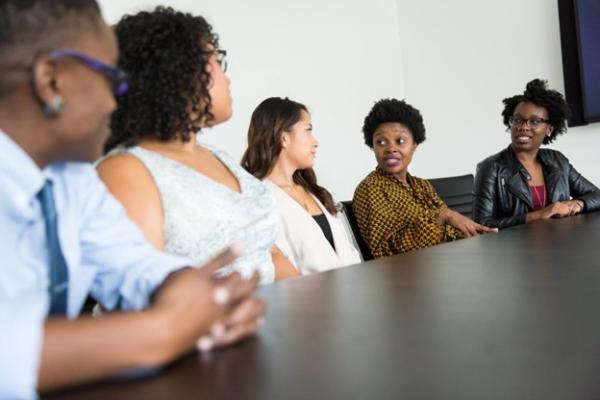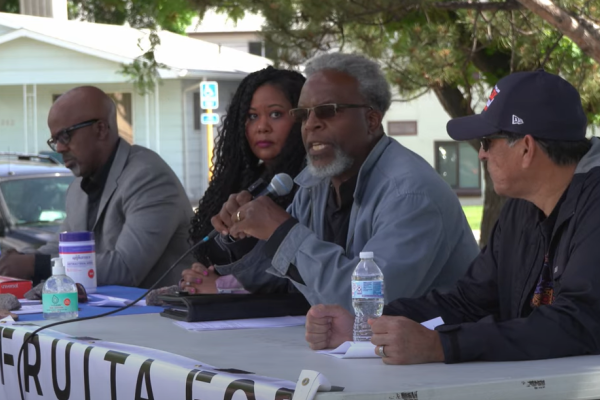The term “community conversation” refers to a mediated discussion among the members of a community. They have been used for a variety of purposes, and research shows that they can be incredibly beneficial.

They help community members better understand issues of local and national importance, and can make people better aware of the resources their communities possess. They can help communities discover their strengths and capacities and can inspire creative thinking in response to existing problems. They can help people forge new relationships, learn new things and develop new skills. They can foster inclusion and respect for diversity. They can provide a springboard to community action.
In other words, community conversations are essential to community growth.
Community conversations are one of the many tools that libraries around the country are using as part of their broader community engagement efforts. How do libraries choose conversation topics? What kinds of topics are they building conversation around, and how are they structuring these conversations?
Across the country, 567 libraries received grants through the American Library Association’s Libraries Transforming Communities: Focus on Small & Rural Libraries initiative, which was funded by a private donor. The grants required libraries to develop conversations around a topic of interest to their community. Our analysis of data from 528 libraries who gave us permission to review their final reports shows that libraries hosted community conversations on topics in more than 20 different subject areas—from health and illness to accessibility, from employment to technology, as well as focusing on the needs and concerns of different underserved populations, including those living in poverty, senior citizens and people of color.
For a complete list of topics, see the chart below:
In this article, we discuss the top five most popular topics that LTC libraries took up in their community conversations: (1) advancing social justice; (2) tackling socio-economic inequality; (3) exploring the future of the community; (4) examining health and illness; (5) asking what the library can do for its community.
Advancing social justice

Seventy-three libraries developed conversations and programming on social justice issues. Among those that focused on social justice, 46 chose race and racism, 11 chose diversity, equity, and inclusion (DEI) more broadly, six chose immigration (including discrimination against immigrants and individuals’ experiences of immigration), five focused on LGBTQ issues, four on challenges facing women and one on incarceration. Commonly, libraries that developed activities around social justice issues structured their programming as book or movie discussions or as conversations that featured an invited speaker. These formats were advantageous for many libraries, in particular, because they enabled libraries to provide participants with a baseline understanding of these complex issues before entering into a discussion.
Many libraries focused their conversations on race and racism, such as Keene Public Library, which designed a discussion titled, “Talking about race, staying curious, moving forward, and being part of the solution.” The library hosted a Zoom discussion that garnered far more participants than expected. Library staff reported that the conversation was productive and a “fantastic experience” for all who attended. Because the discussion was so well-received, library staff were invited to guide two additional discussion groups on the same topic—one at a neighboring community’s church and another at a different public library. The church and public library leaders enjoyed the conversation so much they were inspired to bring the topic to their own communities. Additionally, Keene Public Library’s race discussions had two tangible outcomes: (1) the development of an email listserv focusing on social justice issues; (2) the library’s participation in the community’s first Juneteenth celebration.
The Nyack Library chose to focus its race-related discussion on the book "The Ex-Slave’s Fortune", by Dr. Lori Martin. Dr. Martin was raised in the Nyack community and teaches at a university in a nearby city. The book was also chosen because it “appeals to a wide range of people,” and because it focuses on local Black history and entrepreneurship. According to library staff, the book discussion was quite exciting. Those in attendance asked “plenty of questions,” and appreciated the library staff’s ability to provide copies of the book for participants to keep. Even more, the conversation was so animated that it veered off into other related topics, with residents engaging each other on local history, feminism, and present-day life in the Nyack community. Among their accomplishments, library staff reported feeling proudest about their success in reaching out to the community and garnering participation from individuals who “don’t often participate in library programs,” as well as from other residents from outside of the library’s service area. “We celebrated accomplished Nyackers and Rockland County residents,” library staff reported after the event, and “illuminated aspects of our local history that many people aren’t familiar with.” Doing so enabled the library to “provide a space for people to tell their stories, ask questions, make comments and hear each other outside the chatter of social media and life’s busy demands.”
Tackling socio-economic inequality
Forty-five libraries centered their conversations on socio-economic inequality. Nine libraries discussed poverty and housing precarity, and eleven talked about food insecurity. Another seven focused on the digital divide, and three tackled discrimination against senior citizens. Discussions about socio-economic inequality tended to involve raising awareness of and building partnerships with community organizations already addressing the issue from one or more angles. In addition to their discussions, libraries taking on this topic also used their LTC grant funding to contribute directly to solutions for inequality—for example, by starting a local food pantry or purchasing WiFi hotspots for those without internet access.
Fondulac District Library in East Peoria, Illinois hosted a conversation around the book "Evicted: Poverty and Profit in the American City", by Matthew Desmond, which focuses on the social and economic processes through which people become—or live on the edge of being—homeless. The library advertised their book discussion on the library website, on Facebook and across other social media platforms, and in event listings in the local news. The purpose of the conversation was to raise awareness about the issue of homelessness in the East Peoria community. The discussion resulting from the library’s marketing efforts was productive, and those in attendance discussed both their experience reading the book and some of the volunteer work they did with local community organizations targeting homeless and impoverished populations. Additionally, Fondulac librarians reported several key outcomes resulting from their discussions of "Evicted", including a partnership to help bring social workers to the library to perform regular weekly rounds and connect with patrons in need.
Mount Kisco Public Library in Mount Kisco, New York focused its conversations on the interrelated topics of homelessness and mental health. The library held the conversation outside at Neighbors Link, a community organization with whom the library partnered, and whose mission is to facilitate immigrants’ integration into the community. A number of other organizations participated in the conversation, as well as the town’s mayor. During the event, the library used a whiteboard to collect and organize opinions and ideas from participants. Library staff reported that the whiteboard session was a success, with residents being able “to speak openly about concerns and opinions regarding Mount Kisco and the community.” The event also included a translator, whose presence made Latinx community members “feel more comfortable to share their feelings.” Because the event was enjoyed by so many, the library immediately scheduled follow-up sessions. The library staff expressed hopes that the conversation they began building at Neighbors Link will continue into the future. To that end, Mount Kisco Public Library has also begun making plans to reinstate its Afternoon Movie program for the homeless as well as game nights for this population.
Exploring the future of our community
Another 45 libraries chose to explore the future of their communities, which meant that they focused on bringing residents together to discuss their community’s concerns, wishes and goals for the future. These events often took the form of a roundtable discussion, with no advance preparation required. Discussions typically began by identifying the community’s existing strengths, before turning to residents’ thoughts about how their community could become even stronger. Community leaders, such as town committee members, town council representatives and members of local government departments, were often invited to participate in these discussions.
Lincoln County Public Library in Stanford, Kentucky is one example of a library that chose to orient its community conversation around goals for the town’s future. The library’s roundtable conversation was held outside and was the first large event it had hosted since the start of the COVID-19 pandemic. Perhaps because of this, it garnered an impressive number of participants. During the conversation, titled “Memories on Main,” participants shared memories of their experiences in the town and discussed how they would like to see the community evolve. At the end of the event, library staff collected participants’ “dreams for the future,” and displayed them as ornaments on a tree in front of the town’s courthouse. Following the event, library staff also created a post on Facebook with all the different ideas that participants had shared and discussed. One of the dreams discussed during the discussions included documenting the history of the town’s small merchants and past businesses. Lincoln County Public Library is planning on taking the lead in this documentation process, both in order to preserve Stanford’s history and to make this history available for the town’s younger generations.
Similarly, Breeden Memorial Library in Leavenworth, Indiana, had a “pleasant and enthusiastic conversation” about the different forces that have “caused stagnation in our town” and what residents could do to begin implementing “change and growth.” Several attendees floated ideas such as a coffee or an ice cream shop, which led to a lively discussion about the lack of businesses in the town. Based on the success of its first conversation, Breeden Public Library held an additional discussion about how to balance growth and tradition in Leavenworth. Several community leaders attended the meeting, including the town council and Economic Development members, and as a result, participants left better informed about what could be done to promote new businesses in their community. Among the ideas discussed, residents suggested an artist colony, a winery or wine festival and a biking marathon. Ultimately, library staff commented that the meeting was a success and “held the potential to bring real change to our community.”
Examining health and illness

The fifth most popular topic that libraries discussed was health and illness. In total, 37 libraries chose this topic for their community conversations. Mental health was a particularly prominent topic, though libraries also initiated discussions around physical health. Health-related programs typically brought in experts such as local healthcare providers, who ensured that participants had access to accurate information, and helped community members approach sensitive issues appropriately. Many libraries also focused on making their communities aware of the existing health resources available to them and on building health-related partnerships.
Duncan Public Library in Duncan, Oklahoma titled its health-related discussion, “Brain Support Brigade Kickoff: Discussion on Mental Health.” Library staff started by setting some ground rules and assured participants that the meeting would be a safe place to share personal information. One of the library’s expert partners, a grief counselor from a local health provider, facilitated the conversation. Many participants then shared stories of people they know who live with mental illness, and several spoke about a recent suicide in town—a topic that the grief counselor was well-suited to address. After this discussion, participants then gathered to make stress-relieving objects out of cornstarch, water and balloons.
Interlochen Public Library in Interlochen, Michigan examined health and illness from the angle of drug use, addiction, and recovery. To do so, the library handed out copies of the book, "The Gift of Second Chances: When Shame Isn’t Enough: Seeking Freedom from Addiction", by Patty Steele. Library staff reported that the conversation they hosted went extremely well, with every participant taking a book and many participating, sharing their own stories about drug use and recovery. While the event was “a raw and emotional experience,” it was not negative or confrontational. Instead, “people came together and felt they were in a safe space” to discuss a difficult topic. The fact that the town’s residents seemed eager to combat the stigma of addiction and open up a space for participants to speak openly about it was encouraging to library staff. According to them, the event “set the tone for future discussions.” Interlochen’s discussions on drug use also led to tangible effects—namely, to a partnership with a state harm reduction organization that enabled the library to provide free Narcan to the community.
At the Ely Public Library in Ely, Minnesota, suicide awareness was the chosen topic. The first event in the conversation series was led by a suicide attempt survivor and author, which garnered impressive participation: over 60 residents attended the event, along with several local mental health professionals. The conversation was engaging and productive, with many participants sharing “poignant personal experiences as well as information on what to look for and what to do when a friend or loved one may be contemplating suicide.” One of the most significant outcomes of the series was a draft of a resource list that participants put together during the event.
“What can the library do for its community?”
Eighty libraries chose the topic of asking their community, “what can the library do for you?” These libraries hosted exploratory conversations to identify the different ways they could help their communities thrive. While many other libraries chose to focus on the needs of a specific group (such as families, teenagers or senior citizens), these 80 libraries purposely designed conversations that were open to a diverse range of participants, without focusing on one specific interest or sub-population. To hone in on the specific wishes of their community’s residents, many libraries also developed and sent out surveys to systematically assess the needs, wishes and concerns of the wider community.
For example, a library in Maine began the process of identifying the most pressing needs of its community by designing a “marketing plan to publicize the need for input by all community members.” The plan included using “a variety of social media and local resources,” which were also used to “share the outcomes of the conversations” that the library conducted. Next, the library hosted a Zoom session to collect “equitable and diverse perspectives” from local residents. Following the event, electronic Google forms were sent out to participants via Mailchimp. The library also distributed paper surveys through curbside pickups. Librarians reported several important accomplishments resulting from their participation in the LTC grant, including receiving funds that enabled them to purchase a wide-screen circulation computer for their patrons to use. One library staff member also indicated that LTC provided them with resources to participate in a WordPress course, which gave them the foundational knowledge they needed to design a website for the library.
At the Newfield Public Library in Newfield, New York, staff hosted informal conversations to identify community aspirations. The library conducted five “open house” events at the town’s new History and Activity Center, while also initiating conversations in its own building and at a separate community event. In addition to this, the library also developed a “check-in” survey. To generate as much community feedback as possible, staff posted the survey online, mailed copies to 450 households, and handed out surveys in-person. The survey asked residents what they like most about living in Newfield, what kind of changes or additional programs they would like to see in their town, and how they find out about local happenings. Based on the survey results, the library found that residents enjoy the benefits of the rural nature of their small town, but also hoped to see the town welcome new businesses and additional recreational activities. The library then brought this information to the Town Planning Board, which it hopes will implement some of the ideas community members shared. The first step toward meeting community needs, according to Newfield library staff, will be the development of a community calendar to communicate information about community events and other local happenings.
Conclusion
The topics LTC libraries chose for their community conversations were as diverse as the libraries themselves. While small and rural libraries in the US are often overlooked, they are in fact key cultural institutions, and levers for social transformation. They provide community members with a vast array of programming, resources and vital services, attending to an ever-widening range of needs and aspirations. What we’ve shared here is but a snapshot of the variety of topics these libraries are committed to exploring, in order to create innovative programming and engaging activities for their communities. These events have proven to be places for community members to come together, create new social ties (or reinvigorate old ones), discuss difficult topics and to better understand each other and their changing worlds. For small and rural communities, the opportunities libraries provide are priceless, and with the help of initiatives like LTC, they will only continue to expand and develop into the future.
This article is a contribution of Knology's with the American Library Association’s “Libraries Transforming Communities” initiative, which you can read more about here.



